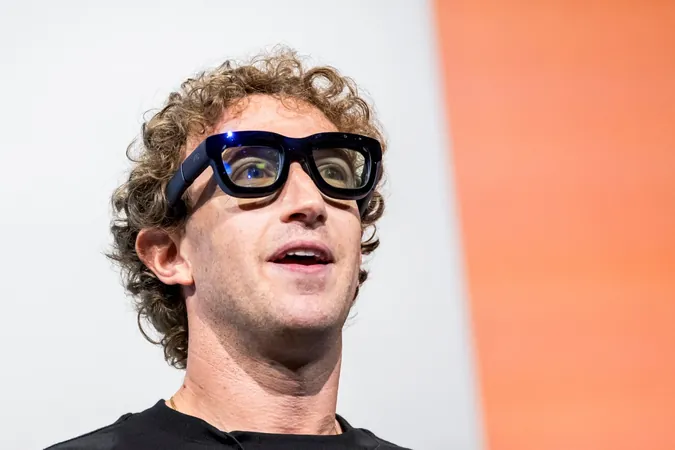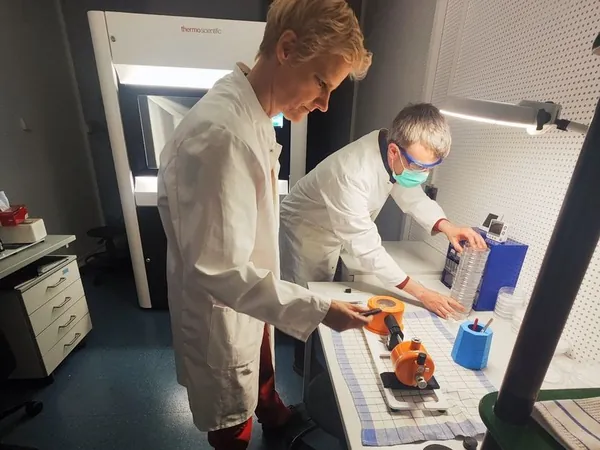
Meta Unveils Orion: The Game-Changer That Could Dethrone the iPhone?
2024-09-28
Author: Li
In a bold move that has left many Silicon Valley and Wall Street enthusiasts scratching their heads, Meta has unveiled its prototype smart glasses named Orion, which the tech giant believes could one day replace the iPhone. The concept may sound far-fetched, but recent advancements make it seem a little more plausible than before.
Orion is no ordinary headset; it's a cutting-edge piece of technology that combines augmented reality (AR), eye and hand tracking, generative AI, and a gesture-detecting wristband. Utilizing micro LED projectors and advanced silicon carbide lenses, Meta claims to have tackled significant challenges in AR display technology. The vision is that users can wear Orion like regular glasses, while simultaneously seeing application windows projected onto the lenses, blended seamlessly into their physical surroundings. Imagine navigating your digital life through gestures, eye movements, and voice commands—all while wearing stylish eyewear.
However, before you rush to pre-order, it’s essential to note that Orion is currently a prototype where size and cost are significant barriers. Priced at a steep $10,000, this chunky device won’t hit the market for several years. Meta has been developing Orion for a decade, and substantial improvements in cost, performance, and miniaturization are still necessary before it resembles something that consumers could find appealing in a mall.
Meta is not the only player in this burgeoning market for smartphone replacements. Snap recently introduced its upgraded Spectacles, which—despite being larger than Orion—offer a more limited field of view. On the flip side, Google teased its own version of smart glasses during its I/O conference, possibly revamping its previous Google Glass misstep. Meanwhile, Apple’s rumored AR glasses echo many features of Orion, and even notable designer Jony Ive is said to be working on a mysterious wearable device with OpenAI.
The tech industry seems primed for a race among giant corporations to deliver a stylish, functional pair of smart glasses that could outdo the capabilities of smartphones. Meta’s Orion highlights two key points: the potential is immense, but the journey to market readiness is still in the early stages.
Compared to the bulky Quest virtual reality headsets that Meta is known for, Orion represents a significant shift in focus towards more user-friendly devices. Unlike VR headsets, which can induce discomfort over extended use, Orion is designed to be comfortable like everyday eyewear, striving to integrate seamlessly into daily life.
Zuckerberg's long-standing ambition to establish a presence in eyewear technology reflects a desire to lessen dependency on platforms like Apple's iOS, which has historically kept social media apps constrained within the Apple ecosystem. The landscape is shifting; with other tech players also surveying the smart glasses space, Meta finds itself in a competitive yet exciting environment.
Zuckerberg's recent keynote on Orion generated notable buzz, energizing an audience of journalists and tech enthusiasts with a sneak peek into its transformative capabilities. While not yet available for direct comparison, reviews indicate optimism about Orion’s potential.
Currently, Meta offers a more accessible product with the Ray-Ban Meta—smart glasses packed with cameras, microphones, sensors, and connectivity features for $299. Though simpler compared to Orion, Ray-Ban Meta represents a foundational step toward Meta’s ultimate goal of technology integration into eyewear.
Every leap in the roadmap from Ray-Ban Meta to Orion involves a commitment to enhancing AI capabilities. The current model integrates Meta’s Llama AI to provide real-time visual assistance, albeit with some limitations such as high latency and less-than-ideal application support. Excitingly, Meta plans to roll out live AI video processing compatible with Ray-Ban Meta, paving the way for smoother user interactions that could eventually find their way into Orion's future iterations.
As for typing—an essential element in today’s smartphone-focused world—Orion relies on voice and gesture rather than traditional keyboards. While some might reminisce about the initial skepticism surrounding the keyboard-less iPhone, Meta remains optimistic. However, creating a natural user experience with Orion is a complex challenge. Early hands-on experiences revealed that functionality often overshadowed usability, with users occasionally struggling to see their surroundings due to overwhelming interface designs.
Meta's intentions with Orion may be ambitious, and while there's potential for true innovation, overcoming technological hurdles will be critical. As Meta navigates this quickly evolving landscape, it seems determined to ensure that both its Ray-Ban Meta and Orion evolve symbiotically, enhancing one another toward an exciting future in wearable technology.





 Brasil (PT)
Brasil (PT)
 Canada (EN)
Canada (EN)
 Chile (ES)
Chile (ES)
 Česko (CS)
Česko (CS)
 대한민국 (KO)
대한민국 (KO)
 España (ES)
España (ES)
 France (FR)
France (FR)
 Hong Kong (EN)
Hong Kong (EN)
 Italia (IT)
Italia (IT)
 日本 (JA)
日本 (JA)
 Magyarország (HU)
Magyarország (HU)
 Norge (NO)
Norge (NO)
 Polska (PL)
Polska (PL)
 Schweiz (DE)
Schweiz (DE)
 Singapore (EN)
Singapore (EN)
 Sverige (SV)
Sverige (SV)
 Suomi (FI)
Suomi (FI)
 Türkiye (TR)
Türkiye (TR)
 الإمارات العربية المتحدة (AR)
الإمارات العربية المتحدة (AR)